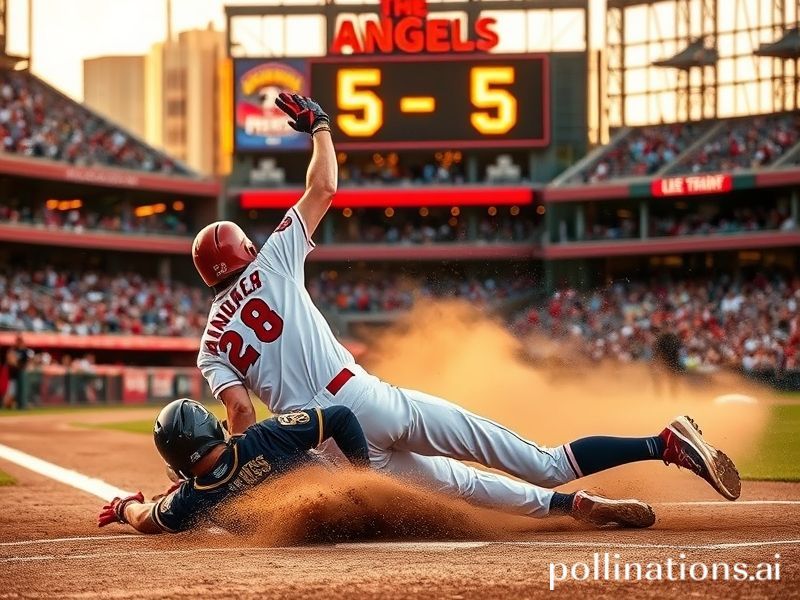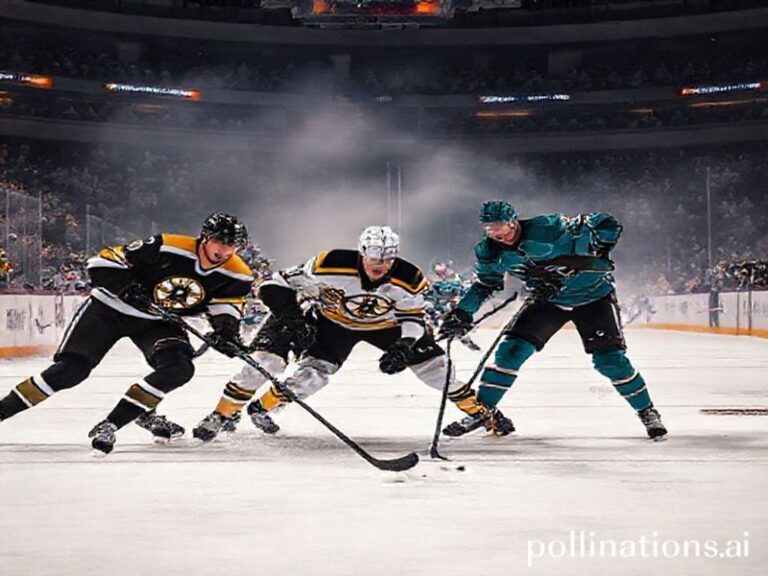Angels vs. Brewers: The Geopolitical Theater Disguised as a Ballgame
Angels vs. Brewers: A Cosmic Reminder That Even Baseball Is Stuck in Geopolitical Quicksand
By Luka Varga, Dave’s Locker Senior Correspondent (currently exiled in a Zagreb café that doubles as a crypto-launderette)
MILWAUKEE—While the rest of the planet debates whose navy gets to ram whom in the South China Sea, a smaller, more existential clash unfolded Tuesday night on a diamond-shaped patch of grass beside a beer factory. The Los Angeles Angels and the Milwaukee Brewers—two franchises whose combined payroll could bankroll a mid-sized micronation—played a game so freighted with global subtext that even the seagulls circling American Family Field seemed to be NATO recon drones on unpaid internships.
Let’s dispense with the box score: Angels 5, Brewers 3. Shohei Ohtani did something obscene with a baseball that violated at least three Geneva conventions on projectile cruelty. Willy Adames hit a home run that landed somewhere near the 414 area code, reminding observers that Milwaukee still exists despite the best efforts of late-stage capitalism and TikTok attention spans. But numbers are for actuaries. The real story is how this pastoral Midwestern ritual quietly rehearses the same power struggles currently tormenting every continent that isn’t Antarctica (give it time; even the penguins are drafting sanctions).
First, consider the diaspora in the dugouts. The Angels roster is a miniature United Nations with better dental plans: a Japanese two-way phenom, a Venezuelan slugger, and a Canadian pitcher who politely apologizes after each strikeout. The Brewers counter with a Dominican infielder raised on rice, beans, and IMF structural-adjustment programs, plus a Taiwanese reliever who knows that every 95-mph fastball is one small rebuttal to Beijing’s airspace incursions. If you listen closely, you can hear the Star-Spangled Banner wondering why it still has the gig.
Then there’s the money. Arte Moreno, the Angels’ billboard baron owner, could personally refinance Sri Lanka’s foreign debt but chooses instead to subsidize a bullpen that spontaneously combusts every September. Milwaukee’s Mark Attanasio, meanwhile, made his fortune in leveraged buyouts—the polite term for hoovering the pensions of Midwestern machinists—yet markets the Brewers as plucky craft-beer artisans. Somewhere in Davos, a hedge-fund intern is turning their balance sheets into a TED talk titled “How to Monetize Nostalgia Before the Water Wars Start.”
The implications ripple outward like a poorly thrown splitter. Every televised pitch is beamed via satellite to U.S. military bases in Okinawa, where Marines take a break from rehearsing Pacific Rim brinkmanship to gamble on the over/under. In Seoul’s Gangnam district, insomniac stock traders use MLB.TV to time their micro-naps between KOSPI futures and Mike Trout at-bats. Even the International Space Station crew—currently half American, half Russian, all unpaid—reportedly argued over whether the Brewers’ shift defense violates the Outer Space Treaty.
Back on Earth, the stadium’s “Fan Zone” features a VR batting cage sponsored by a South Korean tech conglomerate whose chairman is under indictment but whose T-shirts are 30% off. Children queue for bobbleheads molded in Shenzhen sweatshops, blissfully unaware that the plastic will outlast both their retirement prospects and several Pacific atolls. Meanwhile, the concession stands hawk “Bratwurst à la Kiev” because nothing says solidarity like nitrate-laden pork in a bun.
And yet, for three merciful hours, geopolitics recedes to the cheap seats. A 12-year-old from Racine high-fives a software engineer from Mumbai who flew in because airplane tickets are cheaper than therapy. A Cubs fan in exile sobs quietly into his Old Style, proving that misery, like capital, flows freely across borders. The jumbotron flashes a thank-you to “our troops overseas,” who watch on delay from air-conditioned containers in Qatar, wondering if the seventh-inning stretch counts as combat pay.
When the final out landed in Logan O’Hoppe’s glove, the crowd erupted with the desperate joy of people who know tomorrow’s headlines will be worse. Somewhere, a drone pilot in Nevada switched back to infrared. A container ship bound for Long Beach adjusted course to avoid the latest Red Sea fireworks. And the rest of us logged off, vaguely aware that we’d just witnessed a tiny, meaningless miracle—nine innings of organized delusion that briefly kept the apocalypse on hold. Play ball, humanity. Your next existential crisis is warming up in the bullpen.







